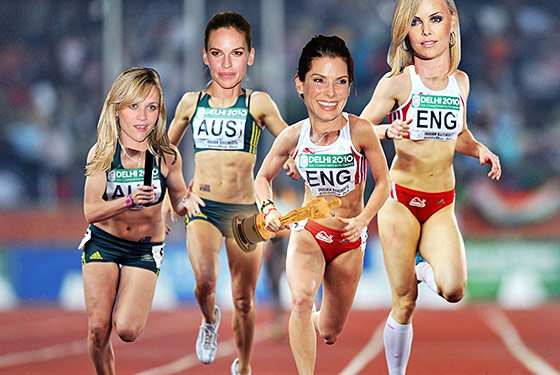
Congratulations, Sandra Bullock: You’ve managed to avoid the Best Actress curse. We’re not talking about the unfortunate trend of Best Actress Oscar recipients losing their husbands after the win — that one famously claimed Bullock as a victim, too — but instead, the just-as-dire career misfortunes that tend to befall most of the ladies who’ve picked up golden hardware over the last ten years. If all goes according to plan, Bullock’s next three films will be Gravity, an ambitious space drama directed by Alfonso Cuarón (Children of Men), an adaptation of Jonathan Safran Foer’s acclaimed novel Extremely Loud and Incredibly Close by Stephen Daldry (The Hours), and an untitled comedy that would find Bullock co-starring opposite A-listers like Meryl Streep and Oprah Winfrey. Finally, Bullock is making the great-sounding movies we always hoped she would make! You would think more actresses would have done this after winning their Oscars. You would have been wrong.
Sure, some major names have won that Best Actress trophy over the last decade — Reese! Charlize! Halle! — but instead of leveraging their Oscars to get into fantastic movies, their careers almost always hit a post-kudos rough patch. It’s a long way down from the height of winning the Academy Award, but these nadirs would have hurt no matter how big the fall:
Prior to her Oscar win for Erin Brockovich, Julia Roberts was coming off hit after hit, and Brockovich cemented a remarkably successful six-film run that included Conspiracy Theory, My Best Friend’s Wedding, Stepmom, Runaway Bride, and Notting Hill. Afterward, Roberts had success as an ensemble player in Ocean’s Eleven, but diminishing returns followed with the films sold mostly on her name, including America’s Sweethearts, The Mexican, Full Frontal, and Mona Lisa Smile. (Even a return to ensemble work didn’t quite gel: Her 2008 drama Fireflies in the Garden never got a U.S. distributor.)
Virtually no one’s been immune to the curse. Reese Witherspoon hasn’t shot much since her Walk the Line win, and her first two follow-ups were Rendition and Penelope. Hilary Swank’s post-Oscar ebbs have been well-documented by Vulture already. Even the indomitable Helen Mirren has run into trouble: After The Queen, she’s mostly made duds like Inkheart and State of Play or long-shelved, oft-delayed flicks like Love Ranch, The Tempest, and The Debt. Marion Cotillard is just about the only Best Actress winner whose profile has been favorably enhanced since her trophy for 2007’s La Vie en Rose, but she was virtually unknown in the U.S. before that win and had nowhere to go but up.
Has the 46-year-old mainstream queen changed her tune completely? Sure, Bullock’s got some very familiar arrows stored in her quiver right now — at any point, she could eschew these more interesting-sounding movies and take on in-development rom-coms with Ryan Reynolds and her The Proposal director Anne Fletcher — but she doesn’t seem to be in any hurry to use them. If anything, Bullock’s maelstrom of a personal life might have helped her at this juncture: Unable to quickly commit to a new movie in the wake of her Oscar win (as so many of her payday-eyeing predecessors had done), Bullock seemed choosy for the first time in her career. After breezing through so many pining, available heroines onscreen, who knew that Bullock’s smartest offscreen move would be playing hard to get?
Nicole Kidman’s Oscar-winning performance in The Hours was meant to cement her status as an A-lister who’d just delivered the mainstream, one-two punch of Moulin Rouge and The Others the previous year. Instead, it spurred Kidman to make several big-budget disasters like The Stepford Wives, Bewitched, The Invasion, The Golden Compass, and Australia.
Virtually no one’s been immune to the curse. Reese Witherspoon hasn’t shot much since her Walk the Line win, and her first two follow-ups were Rendition and Penelope. Hilary Swank’s post-Oscar ebbs have been well-documented by Vulture already. Even the indomitable Helen Mirren has run into trouble: After The Queen, she’s mostly made duds like Inkheart and State of Play or long-shelved, oft-delayed flicks like Love Ranch, The Tempest, and The Debt. Marion Cotillard is just about the only Best Actress winner whose profile has been favorably enhanced since her trophy for 2007’s La Vie en Rose, but she was virtually unknown in the U.S. before that win and had nowhere to go but up.
And then there’s Bullock. We’ll fully admit that any or all of those three enticing projects she’s lined up could turn out half-baked; hey, maybe Catwoman seemed like a solid proposition at one point, too! (No. No, it didn’t.) However, it’s hard to deny that these pictures are all ambitious prestige picks that Bullock either didn’t want to make before her Oscar win or simply never had access to.
Has the 46-year-old mainstream queen changed her tune completely? Sure, Bullock’s got some very familiar arrows stored in her quiver right now — at any point, she could eschew these more interesting-sounding movies and take on in-development rom-coms with Ryan Reynolds and her The Proposal director Anne Fletcher — but she doesn’t seem to be in any hurry to use them. If anything, Bullock’s maelstrom of a personal life might have helped her at this juncture: Unable to quickly commit to a new movie in the wake of her Oscar win (as so many of her payday-eyeing predecessors had done), Bullock seemed choosy for the first time in her career. After breezing through so many pining, available heroines onscreen, who knew that Bullock’s smartest offscreen move would be playing hard to get?




